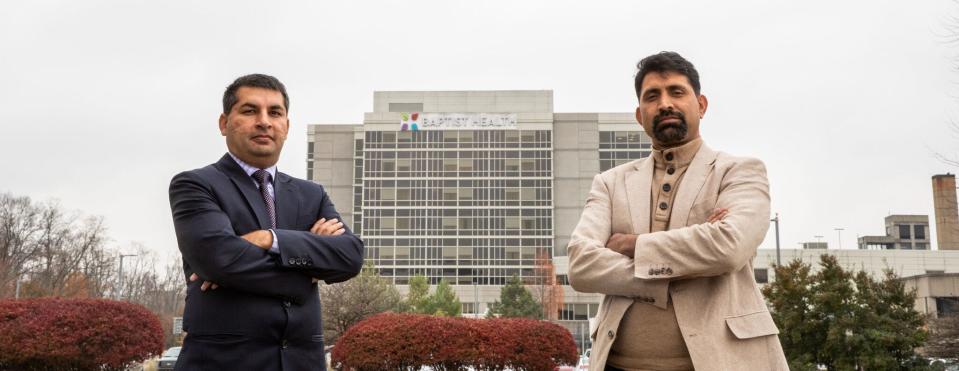'Big sharks can keep the small fish out': Don't let bureaucrats curb home health care competition
Skyrocketing prices and barriers to access continue to plague America's health care system. It is no wonder when you consider that many states continue to allow existing service providers to block new competitors who wish to enter the market.
In 35 states and Washington, D.C., starting certain types of health care businesses requires not only the state government's permission through a certificate of need but also the signoff of big health companies that already have CONs. The government allows certificate holders to essentially veto anyone else who wants to get their foot in the door to compete.
In the words of home health care entrepreneur Dipendra Tiwari, "The big sharks can keep the small fish out of the market."
Spotting a market need in Louisville
Tiwariand and his business partner, Kishor Sapkota, thought they spotted an opportunity in Louisville, Kentucky. Their community is home to thousands of refugees who fled the small Himalayan nation of Bhutan. Individuals needing home care are being poorly served by local hospitals because the aides the big health companies provide generally did not speak their language or understand their culture.
For Subscribers: Seeing a need for maternal care, often from experience, these Louisville women stepped up
Tiwari is an experienced certified public accountant, and Sapkota had worked in home health care. Springing into action like any good entrepreneur, they spotted a market need then created the means to satisfying it.
They plowed through the mountains of paperwork necessary to create their business only to discover that they could not open unless Kentucky determined their business was "needed." And after they submitted their CON application, the local hospital network, with whom they would compete, objected to their submission for a certificate of need.
Unwilling to leave stranded those from their community who desperately needed their services but remained marginalized, Tiwari and Sapkota filed a lawsuit. Now the entrepreneurs are asking the U.S. Supreme Court to hear their case. We filed a petition with the court on their behalf on Tuesday.

Congress reversed on CON mandate; states didn't
In the 1970s, Congress encouraged states to pass CON laws on the misguided theory that restricting investment in medical facilities would decrease health care costs. Just a decade later, the evidence showed that the certificate programs weren't working as intended. Congress repealed its support.
While a handful of states eliminated their programs, in much of the country they continue because hospitals and health associations lobby heavily to keep them in place.
More: Feeling overwhelmed? Louisville therapist says these 8 daily habits can aid mental health
Kentucky's CON program for home health care is a poster child for this protectionist policy. The state uses a simplistic calculation to determine the "need" for services in each county. As long as established companies keep expanding, they can shut out any potential competitors. There is no consideration of whether existing providers are doing a good job or whether a new entrant might offer innovative or niche services the marketplace needs.
When it comes to CON, it is the government – and not customers and potential services providers – who decide what health care services are "needed." That is exactly the opposite of how it should be.
Kentucky is still keeping immigrant entrepreneurs at bay
A national consulting firm hired by Kentucky recommended in 2013 that the state consider suspending the CON program for home health agencies. The Kentucky Hospital Association opposed that recommendation, and the CON program remained in place. After Tiwari and Sapkota filed suit, the association intervened in the lawsuit to ensure that the CON was upheld.
So far, the protectionists have won the day in the court of law.

There is perhaps no sector of the U.S. economy that needs innovation more than health care. CON laws presume that patients are just widgets, without individual needs, and that an oligopoly of government and companies should exclusively determine who is served and who is ignored. Tragically, this system continues to ignore those disproportionately harmed by these policies and limiting one of the best sources of American economic innovation: immigrants.
For Subscribers: New Kentucky abortion law creating confusion for doctors on how to treat miscarriages
One in 4 startups are founded by people not born in the United States. Yet CON laws lock immigrant entrepreneurs out of the marketplace. Can we really say America is the land of opportunity when a huge sector of economy is simply walled off from newcomers to protect those who got here first?

We're asking the Supreme Court to recognize that Americans, whether they were born here or immigrated, have a right to earn an honest living. It is not the government's place to determine whether a business is needed. Patients and doctors are in the best position to decide what medical services are needed, not an impersonal formula cooked up by bureaucrats and propped up by self-interested corporations.
Andrew Ward and Jaimie Cavanaugh are attorneys with the Institute for Justice, which represents Dipendra Tiwari and Kishor Sapkota in their suit.
This article originally appeared on USA TODAY: Supreme Court, protect home health care entrepreneurs from states

